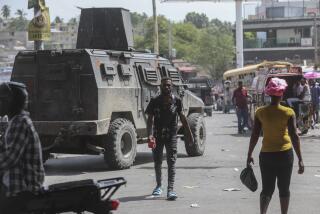E. Timor Peace Force to Move On From Capital
- Share via
DARWIN, Australia — Encouraged by their initial deployment in East Timor, international peacekeepers took control of the capital, Dili, on Monday and prepared to move into Baukau, the territory’s second-largest city.
The commander of the U.N.-sanctioned, Australian-led Operation Stabilize, Maj. Gen. Peter Cosgrove, praised the Indonesian military for extending “great understanding” and said its cooperation was a good sign for the attempt to restore order in the violence-torn land that Indonesia claims as a province.
“There has been no resistance,” Cosgrove told reporters Monday as Australian C-130 Hercules transports shuttled soldiers and armaments into Dili’s Comoro Airport. “This can be seen as an arrival rather than some sort of aggressive military buildup.”
By nightfall Monday, 1,200 combat troops from Australia, Britain, New Zealand, Singapore, France and the Philippines were on the ground. Operations were continuing overnight by sea and air, and by daybreak today, commanders hoped to have nearly a third of the force, or 2,300 troops, in East Timor.
In the weeks ahead, the force will grow to 7,500 members representing 20 nations. It includes a small contingent of U.S. personnel in noncombat roles: logistics, communications and intelligence.
The United Nations has given the peacekeepers a mandate “to use all necessary force” to restore order in East Timor, a former Portuguese colony annexed by Indonesia in 1976. The territory has been devastated by anti-independence militias in the wake of its Aug. 30 vote to separate from Indonesia and seek independence.
As peacekeepers extended their patrols into Dili on Monday, they found a city reminiscent of Beirut in 1982--buildings destroyed, homes burned and looted, streets empty, terrified refugees huddled with their belongings in vacant lots. Aid workers say the militias may have killed as many as 20,000 people and uprooted most of East Timor’s 850,000 citizens.
Columns of black smoke, apparently from burning houses, could be seen in and around Dili. Members of the anti-independence militias were among the hundreds of people who watched the peacekeepers take up positions near the harbor.
The Indonesian commander in East Timor, Gen. Kiki Syahnakri, gave Cosgrove renewed assurances of cooperation. The continued evacuation of militiamen and Indonesian soldiers from East Timor, largely into the neighboring province of West Timor, indicated that he might be intent on keeping his word.
A dozen U.N. staffers, including mission chief Ian Martin, returned to Dili with the peacekeepers Monday. They are the vanguard of a U.N. contingent evacuated to Darwin last week that hopes to administer East Timor during its transition to independence.
Australian Defense Minister John Moore said he believes peacekeepers will be needed in East Timor for several years. According to existing plans, the unit Australia now leads will be withdrawn by Christmas and replaced by a U.N. peacekeeping force.
But these plans, along with everything else concerning East Timor, are contingent upon the Indonesian parliament’s endorsing results of the U.N.-supervised plebiscite and accepting the territory’s vote for independence. Most leading political figures have said they will do so despite widespread public unhappiness at the loss of a province. Parliament is expected to take up the issue in October or November.
Jose Alexandre “Xanana” Gusmao, East Timor’s likely first president, and other independence leaders gathered in Darwin on Monday to start planning their homeland’s reconstruction. Political observers equated their presence here to that of a government in exile.
With security improving in East Timor, and Gusmao planning to return as soon as it is safe for him to do so, international aid organizations were hoping to begin a massive humanitarian relief effort today or Wednesday.
More to Read
Sign up for Essential California
The most important California stories and recommendations in your inbox every morning.
You may occasionally receive promotional content from the Los Angeles Times.













